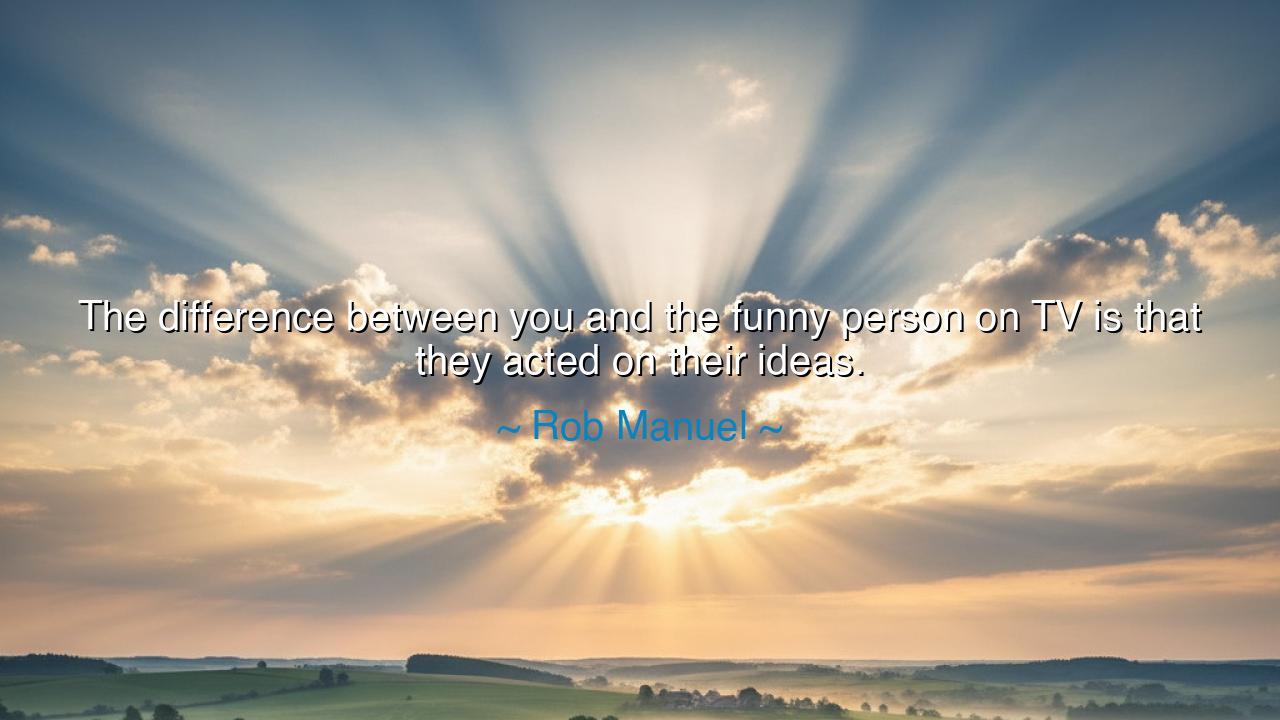
The difference between you and the funny person on TV is that
The difference between you and the funny person on TV is that they acted on their ideas.






“The difference between you and the funny person on TV is that they acted on their ideas.” Thus spoke Rob Manuel, a writer and creator of the digital age, whose words carry a timeless wisdom hidden within the humor of the modern world. In this declaration, he unveils a truth known since the dawn of creation: that imagination without action is like a seed never planted—beautiful in potential, but barren in result. His message is simple, yet profound: greatness, art, and laughter are not reserved for the chosen few—they belong to those who act, who dare to breathe life into their fleeting thoughts before they fade into silence.
When Manuel speaks of the “funny person on TV,” he does not merely mean comedians or entertainers. He speaks of all creators, all dreamers who turn the invisible into the visible. The “funny person” is but a symbol—the one who dares to share what others merely think. For every witty remark that sparks laughter, there are countless others that die unspoken in the minds of those too fearful to act. The difference, as he says, is not talent, but action. The gods of creativity do not demand perfection; they demand movement. The act itself—imperfect, uncertain, vulnerable—is the threshold between thought and legacy.
The origin of this wisdom is as ancient as mankind’s first creation. Consider Leonardo da Vinci, who filled his notebooks with inventions—flying machines, bridges, weapons of marvel. Yet many of his ideas never left the page. They were visions of genius bound by hesitation and time. Now imagine if all of them had lived, if every sketch had been born into reality—how different the world might be. Rob Manuel’s words echo through the centuries, reminding us that ideas are not sacred until they are acted upon. The distance between brilliance and obscurity is often no more than a single step of courage.
Even the ancient poets knew this truth. Homer, whose words still thunder through the ages, may have been no greater dreamer than the storytellers who came before him. But he sang his tales aloud. He spoke them into existence. His voice, carried through time, became the foundation of Western art and myth. How many others dreamed the same stories but never dared to share them? They are forgotten, their ideas lost to the winds. The lesson is eternal: to act upon one’s ideas is to honor them; to hoard them in silence is to let them die unborn.
Manuel’s statement also cuts through the illusion of destiny. Many look upon success and see luck, divine favor, or innate genius. But the wise see discipline, risk, and persistence. The “funny person on TV” was not born with laughter in their bones more than another. They stumbled, failed, rewrote, and performed again. The only difference—the only one that truly matters—is that they did what others only imagined. This is a truth both liberating and daunting, for it means that the power to create, to succeed, to transform lies not in birthright, but in decision.
Yet acting on one’s ideas demands courage, for every act of creation invites the possibility of rejection. The painter risks mockery, the writer risks indifference, the dreamer risks failure. But to hide from such risks is to live in the shadow of one’s own potential. The philosopher Seneca once said, “It is not that we have a short time to live, but that we waste much of it.” The same is true of inspiration: it is not that we lack ideas, but that we lack the will to act upon them. Fear disguises itself as patience, doubt cloaks itself in reason—but the brave act anyway, and in that action, they find truth.
So, dear listener, let this teaching awaken the fire within you: do not hoard your ideas. Do not wait for permission or perfection. The difference between you and the one who is heard, seen, or remembered is not the idea itself, but the will to bring it forth. Begin where you are, with what you have, even if your hands tremble. Write the line, tell the joke, build the dream, make the attempt. For in the act of creation, you join the eternal lineage of those who dared to bring thought into form.
For as Rob Manuel reminds us, the world belongs not to those who think the most, but to those who act. The idea is the spark—but action is the flame that lights the world. And so, when next you laugh at the brilliance of another, remember: the same brilliance lives within you. All that separates you from the stage, the page, or the canvas, is the sacred moment when you, too, decide to act upon your idea—and let it live.






AAdministratorAdministrator
Welcome, honored guests. Please leave a comment, we will respond soon